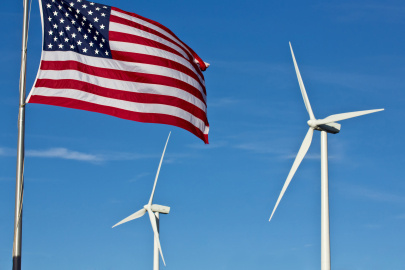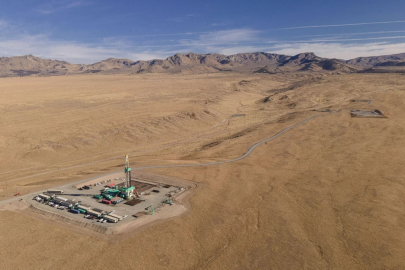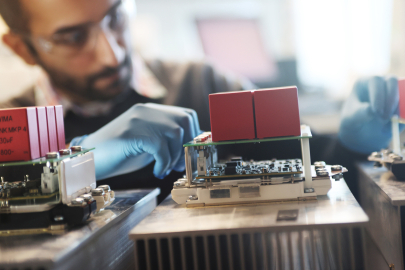-
 EERE is committed to bringing the benefits of energy innovation to every American by making the United States a global leader in renewable energy and energy efficiency technologies.
EERE is committed to bringing the benefits of energy innovation to every American by making the United States a global leader in renewable energy and energy efficiency technologies.
The growing global market for renewable energy technologies and innovations is projected to be worth at least $23 trillion by 2030. To meet the growing demand for new energy technologies and compete effectively in emerging global markets, the American-made industry will need to take a leading role.
Domestic manufacturing is using power and machinery to produce goods from raw materials at home. Manufacturers across the country are mobilizing to produce energy innovations and technologies, creating American jobs and American-made products, strengthening national and energy security, and positioning the U.S. as a global leader in costs, quality, and expertise in a rapidly growing market.
Competitiveness refers to a nation’s level of productivity relative to others in the global economy. American competitiveness is important because it drives economic growth and income levels. Plentiful and affordable energy reduces a critical cost for U.S. businesses, which helps them grow and bolster the nation’s competitiveness.
The U.S. Department of Energy's Office of Energy Efficiency and Renewable Energy (EERE) is committed to increasing American manufacturing and competitiveness in the energy sector to achieve the following:
- Create well-paying jobs across the country and bolster economic development.
- Reduce dependence on other countries for critical minerals and materials needed to manufacture energy technologies.
- Bolster U.S. energy independence through a domestic energy supply.
- Support workforce development to provide American workers with education and training to fill quality jobs in manufacturing, infrastructure development, and other industries related to our energy system.
Why We Need Critical Materials and Domestic Supply Chains
A key to America leading the global energy market is a more secure domestic supply chain for all materials related to energy production, including critical materials.
Currently many critical materials are sourced from other countries. Process and technology innovation can help American industry source more of these materials domestically, use them efficiently, and even find viable alternatives with fewer risks. In doing so, industry will be able to minimize or even mitigate the negative impacts of extracting critical materials on local communities and the environment. Securing our domestic supply chain of these and other materials will provide more reliable energy and help U.S. manufacturers become more competitive on costs, quality, and expertise.
EERE helps the manufacturing sector capitalize on opportunities to improve industrial efficiency and product life cycles by helping manufacturers implement energy-efficiency measures, convert their facilities, or build new facilities to produce or recycle advanced energy technologies.
How EERE Innovation Spurs American Manufacturing and Competitiveness
EERE advances early-stage research and development (R&D) by providing funding and technical assistance for American innovators who can help make the United States the world leader in manufacturing energy technologies.
Although all EERE technology offices contribute to ensuring renewable energy technologies are manufactured in the United States, two of them wholly support this work:
- The Advanced Materials and Manufacturing Technologies Office is advancing R&D to make more energy technologies—such as solar panels, wind turbines, and electric vehicle batteries—in the United States.
- The Industrial Technologies Office is advancing R&D that will reduce greenhouse-gas emissions from energy-intensive manufacturing industries, including steel, cement, chemicals, food and beverage, and paper products.
EERE partners with industry, small businesses, universities, and others to identify and invest in emerging technologies that can create U.S. manufacturing jobs, enhance global competitiveness, and reduce corporate energy. When we invest in technologies that lower the cost of energy, protect the private sector from financial risk, and bolster American manufacturing and competitiveness, we are investing in Americans.
Find more information on funding opportunities.
Critical Materials 101
Improving American Manufacturing & Competitiveness
- Clean Energy Smart Manufacturing Innovation Institute (CESMII)
- Cybersecurity Manufacturing Innovation Institute
- Better Plants
- Industrial Training and Assessment Centers
- Better Climate Challenge
- Manufacturing USA Institutes
- Clean Hydrogen Manufacturing Recycling
- American-Made Geothermal Manufacturing Prize
- Onsite Energy Program
- Industrial Demonstrations Program
- Critical Materials Innovation Hub (CMI)
- Manufacturing Demonstration Facility (MDF) at Oak Ridge National Laboratory
- DOE Industrial Decarbonization Roadmap
- National Blueprint for Lithium Batteries
- U.S. National Clean Hydrogen Strategy and Roadmap
- Supply Chain Road Map for Offshore Wind Energy in the United States
- Solar Photovoltaics Supply Chain Review Report
- Li-Bridge: Bridging the U.S. Lithium Battery Supply Chain Gap
- National Strategy for Advanced Manufacturing
- America’s Supply Chains and Our Clean Energy Story
American Manufacturing and Competitiveness News
-
 EERE invests in research, development, and technology-validation to help modernize the American energy system and position the United States to lead the world in the technical fields that will soon dominate the global energy market.January 17, 2025
EERE invests in research, development, and technology-validation to help modernize the American energy system and position the United States to lead the world in the technical fields that will soon dominate the global energy market.January 17, 2025 -
 The U.S. Department of Energy’s (DOE) Advanced Materials and Manufacturing Technologies Office (AMMTO) released a request for information (RFI) to solicit feedback from stakeholders on AMMTO’s Wide Bandgap Power Electronics Strategic Framework draft.January 16, 2025
The U.S. Department of Energy’s (DOE) Advanced Materials and Manufacturing Technologies Office (AMMTO) released a request for information (RFI) to solicit feedback from stakeholders on AMMTO’s Wide Bandgap Power Electronics Strategic Framework draft.January 16, 2025

